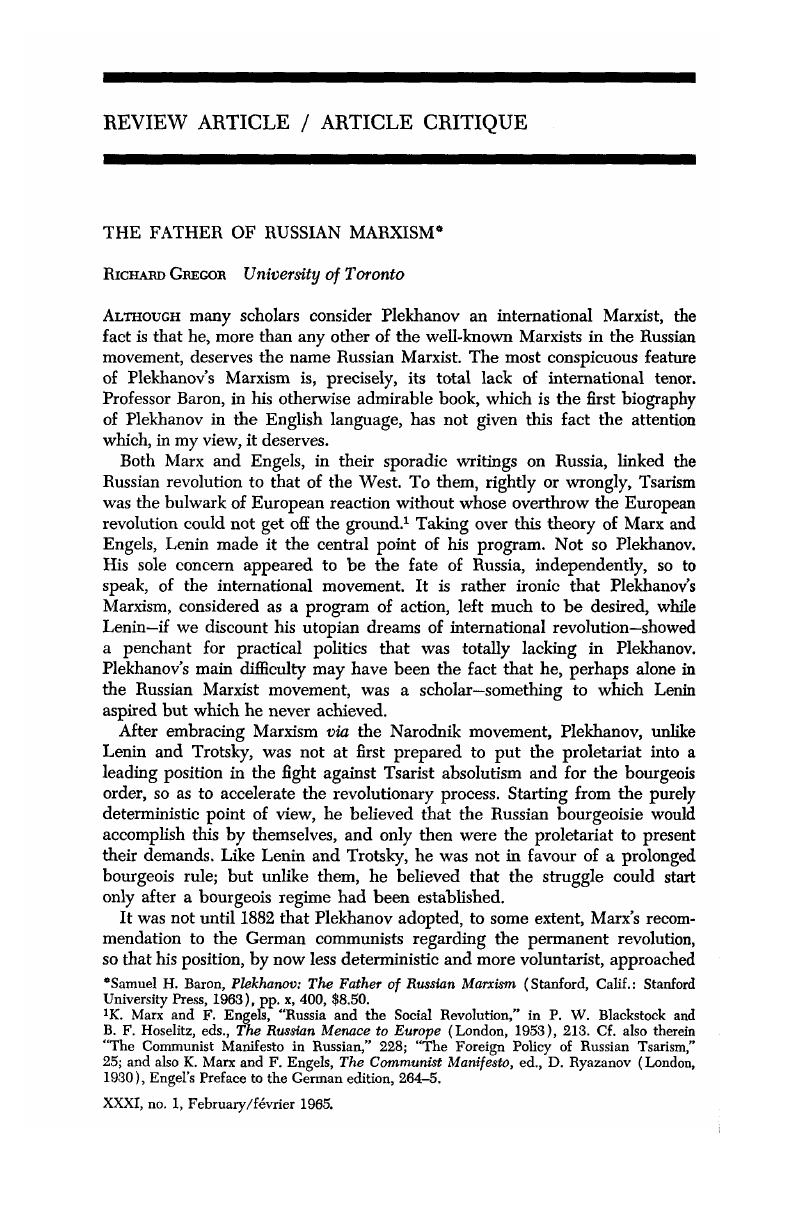No CrossRef data available.
Article contents
The Father of Russian Marxism*
Published online by Cambridge University Press: 07 November 2014
Abstract

- Type
- Review Article / Article Critique
- Information
- Canadian Journal of Economics and Political Science/Revue canadienne de economiques et science politique , Volume 31 , Issue 1 , February 1965 , pp. 132 - 137
- Copyright
- Copyright © Canadian Political Science Association 1965
Footnotes
Samuel H. Baron, Plekhanov: The Father of Russian Marxism (Stanford, Calif.: Stanford University Press, 1963), pp. x, 400, $8.50.
References
1 Marx, K. and Engels, F., “Russia and the Social Revolution,” in Blackstock, P. W. and Hoselitz, B. F., eds., The Russian Menace to Europe (London, 1953), 213.Google Scholar Cf. also therein “The Communist Manifesto in Russian,” 228; “The Foreign Policy of Russian Tsarism,” 25; and also Marx, K. and Engels, F., The Communist Manifesto, ed., Ryazanov, D. (London, 1930)Google Scholar, Engel's Preface to the German edition, 264–5.
2 Lenin, V. I., Sochieniya (2nd ed., Leningrad-Moscow, 1926–1932), vol. XX Google Scholar, “Letters on Tactics” (1917), 101.Google Scholar By now Lenin claimed that a socialist revolution could take place first in Russia with beneficial effects in the rest of Europe. A case could be made that he contemplated this course of action as early as 1915. But there is some doubt as to what Lenin actually meant at the time. Gf. ibid., XVIII, A Few Theses, 313.
3 Ibid., IV, “What Is To Be Done?” (1902), 383–385 and 389.Google Scholar
4 Cf., for example, ibid., VII, “Social Democracy and the Provisional Revolutionary Government” (1905), 185, 190–191, and 194 Google Scholar, or “About the Provisional Revolutionary Government” (1905), 315 and 317.Google Scholar Lenin mentioned the concept in a number of other speeches or writings. It should be pointed out, however, that he held these ideas (perhaps in a slightly different form) long before the 1905 revolution, and that the revolution merely confirmed him in his convictions.
5 Ibid., XX, “The Task of the Proletariat in Our Revolution,” (1917), 114.Google Scholar
6 Ibid., I, “What the Friends of the People Are and How They Fight the Social Democrats” (1894), 194 Google Scholar; VI, “Narodnik-like Bourgeoisie and Distraught Populism” (1903), 117.Google Scholar
7 Ibid., XX, “Letters on Tactics” (1917), 101.Google Scholar
8 IX Vserossiskii Syezd Souetov, no date, no place, Kamenev's speech, 23 Dec. 1921, 32. This ought not to be construed as a contradiction to Lenin's disagreement with Plekhanov on the appropriateness of seizing power. All Lenin wanted at the time was to seize Eower. Once that was accomplished he was quite willing to compromise, as is suggested y his sanctioning of the peasants' seizures of land. Lenin, we must constantly remember, expected that the international revolution would break out at any time and that once this happened, the Russian problem would be solved as well. Hence, any compromises were, for Lenin, merely tactical devices to maintain himself in power until the international revolution broke out.


